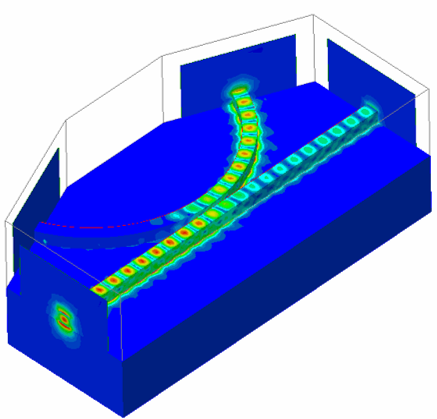PICDA - Photonic Integrated Circuits: Design and Applications
- Type: Lecture (L) + Tutorial (T)
- Semester: Summer Term
-
Place:
Hybrid in SS 2025:
Lecture is online (see ILIAS for details) (L),
Building 30.10, IPQ seminar room (R 3.42) (T), (NOTE: this is not the room stated on the KIT course catalogue)
and via Zoom (see ILIAS for details)
-
Time:
Mo 11:30-13:00 (L)
Thu 11:30-13:00 (T)
- Start: 15.04.2024 (L)
-
Lecturer:
KIT:
- Prof. Dr.-Ing. Christian Koos
- Prof. Dr. Wolfgang Freude
- Prof. Dr.-Ing. Sebastian RandelGuest Lecturers:
- Prof. Dr. Jeremy Witzens, RWTH Aachen, Institute of Integrated Photonics (IPH)
- Prof. Dr. Lars Zimmermann, TU Berlin, Institute of High-Frequency and Semiconductor System Technologies
- Dr. Alireza Tabatabaei Masayekh, RWTH Aachen, Institute of Integrated Photonics (IPH) - SWS: 2
- Lv-No.: 2309478 (L), 2309479 (T)
-
Information:
- From basics to your own design project: Combined lecture and “hands-on” design course using state-of-the art numerical tools.
- Novel format: Inter-university course, offered by leading institutions in the field of integrated photonics.
Language: English
Contents and General Information
Course Overview
Photonic integration has evolved into a key technology with transformative impact on a wide variety of applications, ranging from high-speed data transmission and ultra-broadband photonic-electronic signal processing to optical metrology, 3D-sensing and biophotonics and to further quantum optics and optical computing. However, successful exploitation of photonic integrated circuits (PIC) in these fields crucially relies on both a solid understanding of the underlying principles and technologies and on skillful and effective use of professional simulation and design tools. The idea behind our newly created course “Photonic Integrated Circuits: Design and Applications (PICDA)” is to bridge the gap between theoretical basics and high-impact applications by combining a lecture with a hands-on design laboratory. We will start from a short insight into the fundamentals of integrated optics and end with open design projects that will be solved in smaller teams using a professional design suite (Ansys Lumerical). The course (4 hours, 6 ECTS) has been organized as an inter-university collaboration with contributions from leading institutions in the field of integrated optics (KIT, RWTH Aachen, TU Berlin, Max Planck Institute of Microstructure Physics) and will also comprise a lecture on quantum optics and optical computing by a colleague from Massachusetts Institute of Technology (MIT). Further details can be found in our information sheet and in the ILIAS portal. Please do not hesitate to contact us (picda∂ipq.kit.edu) in case of any questions.
Useful Links
Materials and online teaching platforms of the respective institutions - from which slides, lecture notes, problem sets, and other materials will be made available:
KIT: ILIAS, https://ilias.studium.kit.edu/
RWTH: RWTH Moodle, https://moodle.rwth-aachen.de
TUB: ISIS, https://isis.tu-berlin.de
Contents:
-
Silicon photonics – technology overview
-
Integrated optical waveguides and mode calculation
-
Signal propagation and mode expansion
-
Finite-difference time-domain (FDTD) technique and scattering matrices
-
Selected passive devices
-
Modulators
-
Photodetectors
-
Optical amplifiers and lasers
-
Test and packaging
-
Optical communications
-
Optical sensing and metrology
-
Biophotonics


